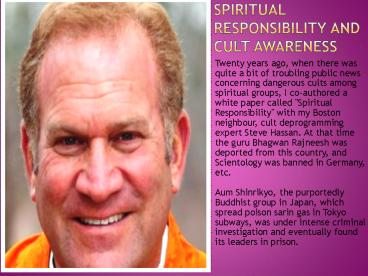Spiritual Responsibility and Cult Awareness - PowerPoint PPT Presentation
Title:
Spiritual Responsibility and Cult Awareness
Description:
Twenty years ago, when there was quite a bit of troubling public news concerning dangerous cults among spiritual groups, I co-authored a white paper called "Spiritual Responsibility" with my Boston neighbour, cult deprogramming expert Steve Hassan. – PowerPoint PPT presentation
Number of Views:164
Title: Spiritual Responsibility and Cult Awareness
1
Spiritual Responsibility and Cult Awareness
- Twenty years ago, when there was quite a bit of
troubling public news concerning dangerous cults
among spiritual groups, I co-authored a white
paper called "Spiritual Responsibility" with my
Boston neighbour, cult deprogramming expert Steve
Hassan. At that time the guru Bhagwan Rajneesh
was deported from this country, and Scientology
was banned in Germany, etc. - Aum Shinrikyo, the purportedly Buddhist group in
Japan, which spread poison sarin gas in Tokyo
subways, was under intense criminal investigation
and eventually found its leaders in prison.
2
Now people are asking about the Diamond Mountain
University incident in the Arizona desert. (NY
Times, June 11, 2012) Having spent a significant
amount of my life training in silent Buddhist
meditation retreats, I have seen that, aside from
the undeniable benefits of such rigorous
contemplative and monastic practice disciplines,
isolation and extended silence can for some also
have dangerous repercussions. This may be the
case for the insular spiritual group founder,
Geshe Michael Roach, and his devoted
followers. This scandal is very troubling as
well as troublesome, and raises a lot of
questions about spiritual centers and
accountability. Michael's group is not the only
one whose retreats might look, to the outside
viewer, like a mere refugee camp, trailer camp,
barracks or prison. Traditional long intensive
practice retreats and monastic training rules of
reasonable efficacy are well known to sometimes
take unprepared people over the edge practices
including long-term silence, fasting, celibacy,
sleep deprivation, restricted outside contact,
secret teachings, proscribed readings, etc.
All these can lend an aura of cultic activity
to a fairly harmless group such as any ordinary
short-term yoga retreat or prayer enclave, things
that we ourselves may be engaged in without
remaining very conscious of or vigilant regarding
potential dangers and downsides.
3
- Having experienced these austere conditions and
austerities myself for lengthy periods of time,
including several years on end, I know that these
things are effective and can be appropriate it's
all a matter of degree, intensity, intention,
management and coordination, to be balanced and
rounded out with various healthy and nurturing
mitigating factors for purposes of group
well-being and inner individual flourishment. - Unfortunately, unstable personalities who are
subjected to such conditions are especially
vulnerable I've found it useful to thoroughly
screen and prepare potential trainees who wish to
participate, including observing individuals over
a period of time and assuring that they complete
shorter intensive retreats before becoming overly
involved in long-term retreats in often marginal
conditions. - It is worth pointing out that experienced cult
experts make a significant distinction between
generally harmless cults (the die-hard Boston Red
Sox fans or the Yale Skull and Bones Secret
Society) and dangerous cults (David Koresh's Waco
group, and Jim Jones' Jonestown fanatics), and
point out that all cults are not created equal
nor are equally harmful. - There is not much professional oversight or
organizational hierarchy in the Buddhist
tradition, although every authorized and
qualified teacher answers to their own teacher
and their own lineage tradition to a certain
extent and traditional monasteries in the Old
World had their own systems of checks and
balances, including communal monthly rituals and
acknowledgements of wrongdoing.
4
This has been the case for over twenty-five
hundred years, since the time of the Enlightened
Buddha. Eastern disciplines like Buddhism are
fairly new in this modern world and our Western
culture we each have to rely on our critical
judgment, kindred spirits, elders and the study
of other traditional sources of knowledge in
order to make intelligent decisions. "As a
simple Buddhist monk" and not as a pope-like
figure, the Dalai Lama himself has spoken out on
many occasions "against ethical lapses,
exploitation, abuse and corruption among
spiritual teachers." He believes that "we should
be Twenty First Century Buddhists, socially
engaged and open to science and psychology and
other religions, developing critical thinking
through modern education." He has exhorted us to
be vigilant and discerning, self-critical as well
as tolerant -- supporting each other in spiritual
friendship, collegiality and community -- for the
sake of advancing a balanced and harmonious,
wise, altruistic, and actively engaged
compassionate path of enlightenment, of genuine
benefit to the entire world. An old Tibetan
saying goes like this "Don't spy out the flea in
another's hair while overlooking the yak on one's
own nose. Follow Lama Surya Das on Twitter
www.twitter.com/LamaSuryaDas To find out more
about Lama Surya Das, visit here -
http//en.wikipedia.org/wiki/Surya_Das































